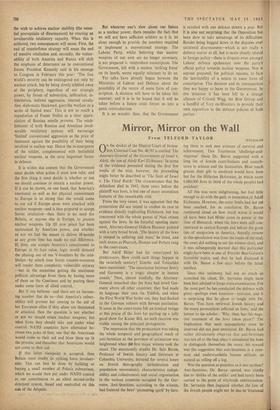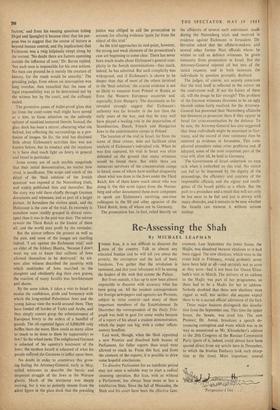Mirror, Mirror on the Wall
From TELFORD TAYLOR
JERUSALEM
ON the docket of the District Court of Jerusa- lem, Criminal Case No. 40/61 is entitled 'The Attorney-General of the Government of Israel v. Adolf, the son of Adolf Karl Eichmann.' In terms of the evidence, presented during the first few weeks of the trial, however, the proceeding might better be described as 'The State of Israel v. The Third Reich.' The circumstance that the defendant died in 1945, three years before the plaintiff was born, is but one of many anomalous features of this remarkable trial.
From the very outset, it was apparent that the prosecution did not intend to confine its case to evidence directly implicating Eichmann, but was concerned with the whole gamut of Nazi crimes against the Jews. In his forceful opening state- ment, Attorney-General Gideon Hausner painted with a very broad brush. The history of the Jews is steeped in suffering and tears,' he cried, and such names as Pharaoh, Haman and Petlura rang in the court-room.
But Adolf Hitler had far outstripped his predecessors. How could such things happen in the twentieth century? Goethe and Treitschke were mentioned: 'The association between Jewry and Germany is a tragic chapter in human annals.' Then, almost wistfully, the Attorney- General remarked that the Jews had loved Ger- many above all other countries; they had made its language their own via Yiddish, and when the First World War broke out, they had flocked to the German colours with fervent patriotism. If some in the court-room felt an ironical twinge at this praise of the Jews for putting up a jolly good show for Kaiser Bill, no such reaction was visible among the principal protagonists.
The impression that the prosecution was taking the whole temporal and geographical reach of anti-Semitism as the province of accusation was heightened when the first major witness took the stand. The enormously erudite Dr. Salo Baron, Professor of Jewish history and literature at Columbia University, lectured for several hours on Jewish demography (urbanisation and population movements), characteristics (adapt- ability and cohesiveness) and social organisation in the various countries occupied by the Ger- mans. Anti-Semitism, according to the witness, had fostered the Jews' pioneering spirit' by forc- ing them to seek new avenues of survival and achievement. This Toynbeean 'challenge-and- response' thesis Dr. Baron supported with a long list of Jewish contributions and contrib- utors to science and the humanities. How much greater their gift to mankind would have been but for the Hitlerian Holocaust, in which some 6,000,000 Jews (a third of the whole people) had perished!
All this was most enlightening, but had little enough to do with the guilt or innocence.of Adolf Eichmann. However, the outer limits had not yet been reached, for in conclusion Dr. Baron ruminated aloud on how much worse it would all have been had Hitler come to power at the time of Bismarck, when the Jews were still con- centrated in central Europe and before the great tide of emigration to America. Astrally remote as this speculation was from the issues of the trial, the court did nothing to cut the witness short, and it was subsequently learned that this particular might-have-been is one of Premier Ben-Gurion's favourite topics, and that he had discussed it with Dr. Baron a few days before the latter testified.
Since this testimony had not so much as scratched his client, Dr. Servatius might have been best advised to forgo cross-examination. For the most part he has conducted the defence with great—perhaps even excessive—restraint, and it is surprising that he chose to tangle with Dr. Baron. 'You have reviewed Jewish history and the many persecutions inflicted on Jews,' said the lawyer to the scholar : 'Why, then, has this nega- tive treatment of the Jews taken place?' The implication that such unpopularity must be deserved did not pass unnoticed. Dr. Baron had rather chivalrously observed that anti-Semitism was not all to the bad, since it stimulated the Jews to distinguish themselves the more; his reward was the suggestion that anti-Semitism is a com- mon and understandable human attitude, as natural as rolling off a log.
Was the question as pointless as it was tactless? Anti-Semitism, Dr. Baron opined, was chiefly due to 'dislike of the unlike' and had rarely been carried to the point of wholesale extermination. Dr. Servatius then inquired whether the fate of the Jewish people might not be due to 'irrational factors,' and from his ensuing questions (citing Hegel and Spengler) it became clear that his pur- pose was to suggest that the course of history is beyond human control, and (by implication) that Eichmann was a twig helplessly swept along by the torrent. 'No doubt there are factors operating outside the influence of men,' Dr. Baron replied, 'but each man is responsible for his own actions. No man can pretend he is merely the creature of history, for the result would be anarchy.' The presiding judge, from whom an interruption was long overdue, then remarked that the issue of legal responsibility was to be determined not by the witness but by the court, and the colloquy ended.
The protective panes of bullet-proof glass that jut from the court-room wall might have served as a lens, to focus attention on the unlovely splinter of mankind immured therein. Instead, the glass, dock has been a mirror, obscuring what sits behind, but reflecting the surroundings in a pro- fusion of images. So far, the trial has disclosed little about Eichmann's activities that was not known before, but its conduct and the reactions to it have shed much light on Jewry in general and Israel in particular.
Some events are of such terrible magnitude that their initial demonstration, no matter how vivid, is insufficient. The scope and much of the detail of the 'final solution of the Jewish question' was exposed at the Nuremburg trials, and widely publicised then and thereafter. But the story was told there chiefly through German documents and witnesses, and as part of a larger picture. At Jerusalem the victims speak, and the Holocaust is the core of the trial. Its enormity is somehow more readily grasped in distant retro- spect than it was in the post-war daze. The mirror reveals the Third Reich as the foulest of them all, and the world may profit by the reminder.
But the mirror reflects the present as well as the past, and some of the images are startling indeed. 'I am against the Eichmann trial,' said an elder of the kibbutz Hanita, 'because I don't
want my son to know that millions of Jews allowed themselves to be destroyed.' As wit- ness after witness described the passivity with which multitudes of Jews marched to the slaughter and obediently dug their own graves, the reaction of many Israelis was bewilderment and shame.
By the same token, it takes a visit to Israel to realise the confidence, pride and buoyancy with which the long-settled Palestinian Jews and the
young Sabras view the world around them. They have fended off hordes of Turks and Arabs, and
they simply cannot grasp the submissiveness of European Jewry to the orders of a handful of guards. The oft-repeated figure of 6,000,000 only baffles them the more. How could so many allow so much to be done to them by (apparently) so few? So the wheel turns. The enlightened German is ashamed of his country's treatment of the Jews; the modern Israeli is ashamed of what his people suffered the Germans to inflict upon them. No doubt in order to counteract this grow- ing feeling the Attorney-General, early in May, called witnesses to describe the heroic and desperate struggle of the Jews in the Warsaw ghetto. Much of the testimony was deeply moving, but it was so patently remote from the silent figure in the glass dock that the presiding
justice was obliged to call the prosecution to account for offering evidence 'quite far from the object of this trial.'
As the trial approaches its mid-point, however, the strong and weak elements of the prosecution's case are beginning to come clear. There has never been much doubt about Eichmann's general com- plicity in the Jewish exterminations—that much, indeed, he has admitted. But such complicity was widespread, and if Eichmann's is shown to be deeper than that of most of the others involved in the 'final solution,' the crucial evidence is not so likely to emanate from Poland or Russia as from the Western European countries and. especially, from Hungary. The documents so far revealed strongly suggest that Eichmann's authority was far broader in the late than the early years of the war, and that he may well have played a leading role in the deportation of Scandinavian, Dutch, French and Hungarian Jews to the extermination camps in Poland.
The location of the trial in Israel, far from the scene of these crimes, does not facilitate close analysis of Eichmann's individual role. When he was first captured, his trial in Israel was often defended on the ground that many witnesses would be found there. But while there are numerous survivors of the concentration camps in Israel, some of whom have testified eloquently about what was done to the Jews under the Third Reich, few of them knew much about who was doing it. On this score (apart from the Nurem- berg and other documents) those most competent to speak are Eichmann's surviving one-time colleagues in the SS and other agencies of the Third Reich, most of whom are in Germany. The prosecution has, in fact, relied heavily on
the affidavits of several such individuals. made during the Nuremberg trials and received in evidence against Eichmann in Jerusalem. Dr. Servatius asked that the affidavit-makers, and several other former Nazi officials whom he wishes to call as defence witnesses, be given immunity from prosecution in Israel. But the Attorney-General rejected all but two of the initial requests, and in both instances the individuals in question promptly declined.
The judges, of course, are acutely conscious that the trial itself is reflected in the mirror on the court-room wall. If not the fairest of them all, will the image be fair enough? This problem of the German witnesses threatens to be an ugly blemish unless fairly resolved, for the Attorney- General has presented their Nuremberg affidavits but threatens to prosecute them if they appear in Israel for cross-examination by the defence. To be sure, the Attorney-General has also suggested that these individuals might be examined in Ger- many, and the record of their testimony then be received as evidence in Jerusalem, This com- plicated procedure raises other problems and, if adopted, some of the most important part of the trial will, after all, be held in Germany.
The Government of Israel undertook no easy task when it embarked on this trial. No visitor can fail to be impressed by the dignity of the proceedings, the efficiency and courtesy of the responsible officials, and the vigour and intelli- gence of the Israeli public as a whole. But the path to a procedure and a result that will not only be but seem to be fair and just is strewn with many obstacles, and it remains to be seen whether the Israelis can traverse it without serious mishap.







































 Previous page
Previous page